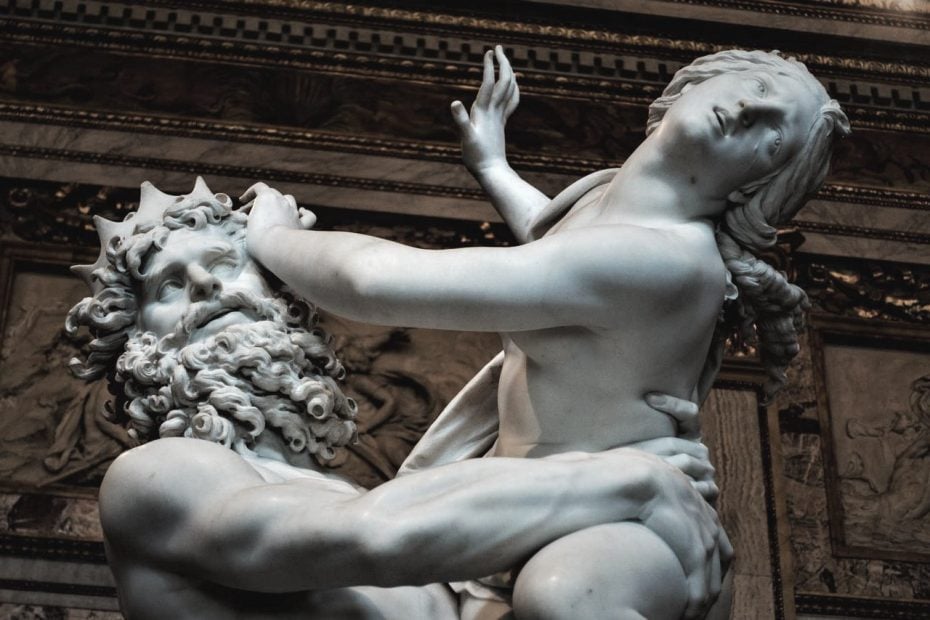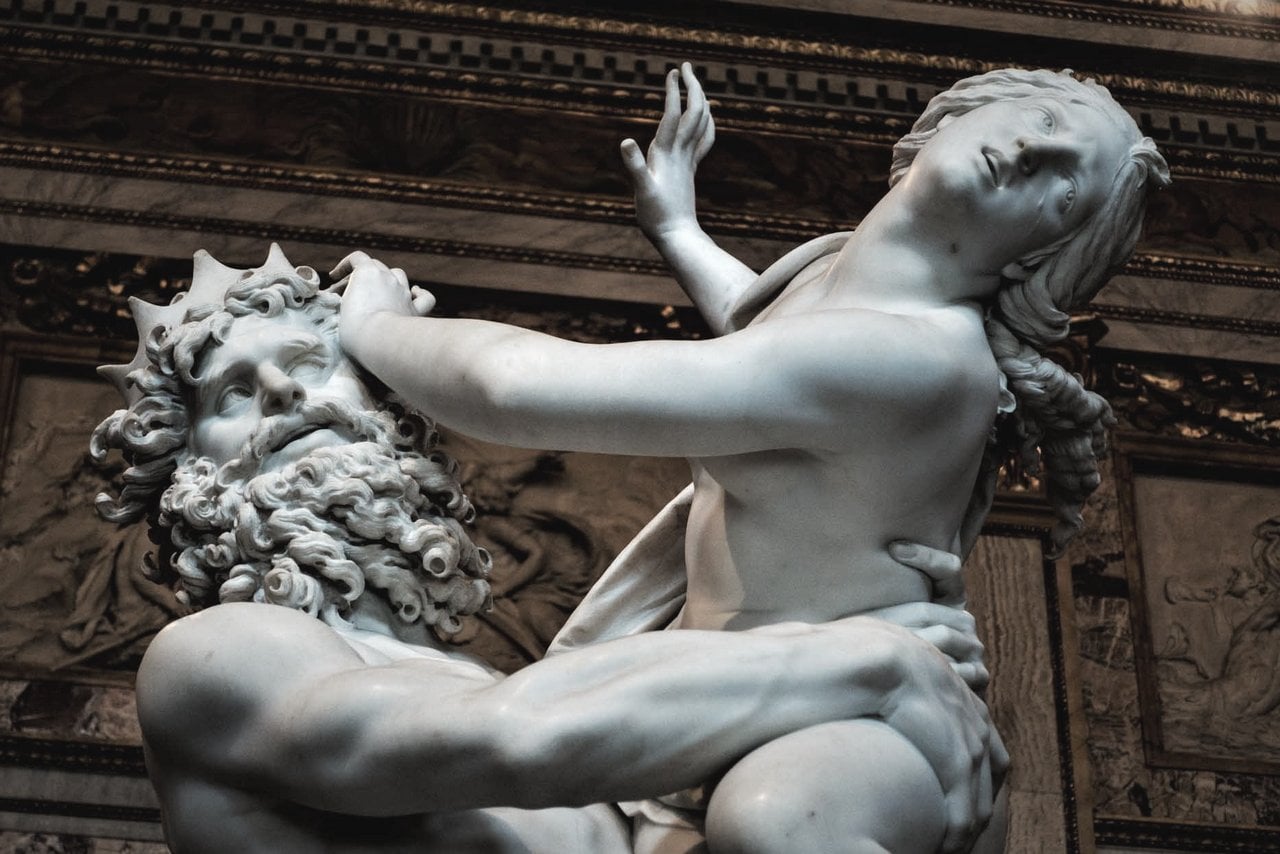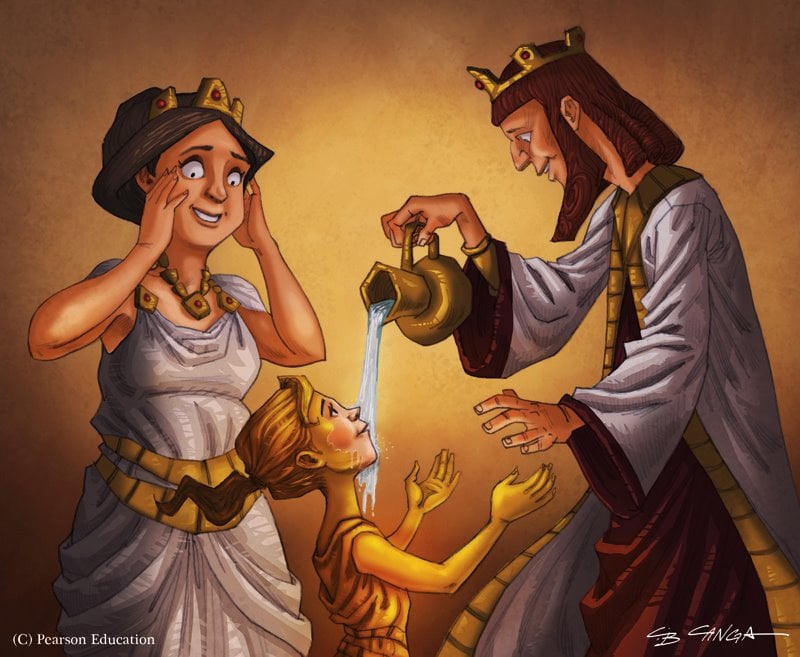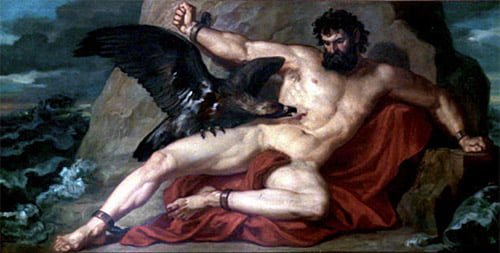The Myth of Hades and Persephone
The myth of Hades and Persephone is one of the well known Greek myths.
Hades was the brother of Zeus and the god of the underworld.
Persephone was the daughter of Demeter, the Goddess of nature.
The myth of Hades and Persephone is one more myth of love and abduction in the Greek mythology.
Hades and Persephone: the beginning of the myth
Hades fell in love with Persephone and decided to kidnap her. The myth says that in one of the rare times he left the Underworld, he traveled above ground to pursue her, while she was gathering flowers in a field.
One day Hades, God of the Underworld, saw Persephone and instantly fell in love with her.
Adis (Hades) confided his secret in his brother Zeus, asking for help, so the two of them concocted a plan to trap her. As the girl (Persephone) played with her companions, they caused the ground to split underneath her.
Persephone slipped beneath the Earth and Hades stole her to the Underworld where he made her his wife.
The myth says that Persephone was very unhappy, but after much time, she came to love the cold-blooded Hades and lived happily with him.
A different version of the myth of Hades and Persephone
The myth of Hades and Persephone also has a different version; in this one Demeter was present when Persephone was kidnapped by God Hades but was tricked by Zeus and Hades.
That morning when Demeter descended on Earth with her daughter Persephone , she left her to play with the sea nymphs called Nereids and the Naiads who were the freshwater nymphs of the lakes, springs and rivers.
Persephone and flower Narcissus
Demeter went to supervise her bountiful crops. As Persephone engaged in play and with the rest of the group, her attention fell upon the potently fragrant valley nearby and she couldn’t take her eyes of the yellow flower narcissus. She called upon her playmates to accompany her, but they couldn’t possibly go with her as leaving the side of their water bodies would result in their death.
The flower Narcissus was planted there by Gaia, who was following the orders of Zeus. The goal was to enchant Persephone and attract her, away from her guides.
Hades Kidnapping Persephone
Persephone danced her way to the garden alone and tried to pluck the narcissus from the bosom of Gaia. It drained her energies as the narcissus only came out after a lot of pulling. But suddenly, to her utter fright, she saw the tiny hole from which she had drawn out the flower shaft, began to rapid grow in size until it started to resemble a mighty enormous chasm. From this came the vigorous galloping sounds of multiple horses and such sudden happenings only froze the frail beauty to her feet.

Out of all her friends only the naiad Cyane tried to rescue the crying Persephone but she was no match for the powerful Hades. Bereaving her friend’s kidnap, Cyane melted into a pool of tears and formed the river Cyane at the spot.
Goddess Demeter trying to find Persephone
Demeter rushed back to where she had left her daughter and found only the Cyane river there with the other nymphs weeping. Worried as she was, she asked all as to the whereabouts of her beloved daughter.
Nobody could tell her anything at all and furious that they couldn’t protect her child, she cursed all the nymphs into becoming heinous women with plumed bodies and scaly feet, called the sirens. It was only the river Cyane who helped her by washing over the belt of Persephone, indicating that something gravely wrong had happened.
Demeter went mad and hunted for her daughter everywhere. The myth says that she even disguised herself as an aged lady and with lighted torched in her hands roamed the Earth for nine long days and nine long nights.
Finally, she met Hekate, the deity of magic, witchcraft, spirits and crossroads, at the dawn of the 10th day who had pity at her dismal condition and asked her to seek help from the all seeing Helios, the sun god. Helios told Demeter all about how Hades had dragged Persephone into the underworld.
Persephone in the Underworld
Persephone’s mother, Demeter, begged her brother Hades to allow Persephone to come back to the livings, denoting that the young Persephone was not supposed to live in the underworld. Hades consulted with Zeus and they both decided to allow Persephone to live on earth for six months each year, while the rest of the time she would be on his side in the Underworld.
Before leaving the underworld, Persephone had been persuaded to eat four seeds of a pomegranate. In ancient mythology, to eat the fruit of one’s captor meant that one would have to return to that captor or country, so Persephone was doomed to return to the underworld for four months of the year. But she was allowed to spend the remaining two-thirds of the year with her Earth Mother, Demeter.
The myth of Hades and Persephone is associated with the coming of Spring and Winter: When Persephone comes to the Earth, it’s springtime. When she descends to Hades, it is winter.
Celebrating the myth of Persephone
The disappearance and the return of Persephone were the occasions of great festivals in ancient Greece, among them the Elefsinian rites, whose secrets were so closely guarded that little is known about them today.
Some experts believe the rites or mysteries fostered the idea of a more perfect life after death, and thus helped to lay the groundwork for the coming of Christianity, which upholds the idea of everlasting life.








I dislike the fact that everyone shadows Hades over the true god of death, Thanatos.
I guess it’s the fact that Thanatos didn’t have as much authority as Hades. All well. Other than that, I am very interested in this article.
Hades was not the god of death, fake or otherwise, he was the god of the Underworld
False,
Hades is the god of the earth (lowercase ‘e’) and everything in it, which include minerals, gems, the Underworld, and everything in between.
After the Titanomachy, when the three brothers were dividing up the world, Zeus chose the sky and everything in it, Hades chose the earth and everything in it, and Poseidon was left with the Mediterranean Sea (not to be confused with the sea beyond the isle, which is ruled by Oceanus, or the deep sea which is ruled by his wife, Tethys.)
Because both Hades and Zeus grabbed the sky and earth respectively, they’re power never diminished. Everything is born under the sky and everything gets put back into the ground, so their respective kingdoms continue to grow. Whereas Posiedon’s has barely anything in it that worship him, thus why his temper is terrible, why he’s the father of earthquakes, and why no one really likes it when he comes of parties.
Since the Greeks don’t really have a “good” god or an “evil” god, Poseidon is really close to being the “evil” god because everyone was terrified of the sea.
Hades, Thanatos, Eris, Cronus; these gods were never feared as they were just part of the cycle.
Well, maybe Eris was. She did cause the War of Troy after all.
“Why no one really likes it when he comes of parties”
Your mythology is sound and I applaud you – but that line makes it 10x better too!
I think you are right because Hades never started as the God of the underworld, But in every article, or every YouTube video there will always be false information. In all reality, no one knows what happened in Greek mythology or who was what. They just assume.
Actually, Hades was the Lord of the underworld and God of death and riches.
M.Poulos In the Greek myth book that I’m reading it says that Hades is the lord of the dead
Hades is NOT the god of death but the god of THE DEAD, riches, the underworld and earth (not to be confused with Gaea the Mother Earth)
He was the God of the Underworld but one of his many abilities was that he could cause death.
Thanatos was the god of death, but Hades was the lord of the underworld. There is a difference, also, Thanatos is the god who ferries the dead to where they will be judged
Charon was the Ferryman of souls
Thanatos is the god of death, in fact, he is Death, but he did not ferry souls to the underworld, that was Charon’s job. Thanatos was more like the Reaper, when someone’s time was up he would go to them, touch them, and kill them. he also kept people from returning to life from the underworld (like a life/death border patrol).
Maybe because Hades Is not the God of Death… Is the God of the Underworld, the one that decides if you go the Elisean fields or not but he was never the God of Death himself. Check your history and your muyths
I agree! Thanatos totally gets underestimated. Though I wouldn’t call him a god: he’s one of the demons that Pandora let loose.
Hades however is god of the earth (as in soil, rocks, minerals and crystals) and the underworld. The underworld is not to be confused with death.
It is a realm and not a term.
True, but Hades has the underworld in general, including death its self
i dont like the fact that everyone treats Hades with no respect, he is not an evil god as everyone expects. The underworld was draw for with water and the sky by his brother Zeus and Poseidon.
Thanks for the information! I needed this for my Greek Mythology project in school about Hades. Helped a lot! Again, Thanks
thank you from me as well! i am also in the process of putting together a project for school. this information has been helpful. i agree with monte. why does everyone hate hades? just because he got the underworld instead of water or sky, does not mean he has to be a terrible, unmerciful god.
I completely agree. Hades is still one of the Olympians.
Reading the story of Hades and Persiphone has made me recall that Hades has been known as Hell as long as I can remember. Why is that? Hades/Hell is supposedly is a cruel, torturous place eternally filled with excruciating pain and anguish.
Actually, Hell is the place of eternal damnation, and Hades is the God of the Underworld. There is a Hell in the underworld, but there is often a place of reward (Heaven?) As I recall. Hades was just above both of these things in the Greek myths. Hades isn’t even supposedly that evil, as far as I know -he drew straws and ended up with the Underworld. He’s equal to his brothers
“Hell” is a Christian punishment for sin during one’s life (Dante’s, ‘Inferno.) In Greek mythology everyone went to the underworld or Hades upon their death. There they lived eternally as a “shade” (soul?). It was not a punishment and in fact was not a bad place as Persephone found out in time which is the reason she stayed there every year during the winter and with her mother in the summer. Furthermore she had to stay there cause she broke the rules and ate a pomegranite which was not allowed in Hades, Like all adolescent girls she broke the rules of “eating” and asserted her womanhood (as opposed to girlhood) by eating in the underworld and being “bad.” She loved Hades in time and he always honored her and respected her. She literally become his equal as the Queen of Hades. This was hardly the behavior of a “rapist” but more like a loving male partner.
Actually Persephone stayed, because Hades tricked her into eating 3 Pomegranate seeds. These were foods that belonged to the underworld.
Now she must be his wife for 3 moths out of the year. Her mother, Demeter weeps for her absence for winter. For spring and summer,her mom rejoices.
This carefully explains the change of seasons.
Because of the Bible and Christianity. They would refer to their own Hell as Hades (meaning Tatarus). It soon became synonymous with Hell (even though Hades is like Heaven, Limbo, and Hell combined into one place).
Right.
Let’s not forget that Hades also contains Elysium, the Elysian Fields.
May King Minos have mercy!
A mistake to be so linear. This story is about the sexual maturation of the young female, moving into erotic relationship with men despite the perfectionistic demands of the man-hating matriarchy.
I like the info but there is one problem and that would be, that it does not mention the actual god of death Thanatos.
Other then that, it helped me to finish my mythology project for school
in the Olympian series, which has to do with the Roman forms of the gods, it did mention Thanatos
The aspect of the Persephone / Hades story that women seem to not realize, is that Hades did not “rape” Persephone. He took her away from Demeter her Mother. Every woman has to be separated from her Mommy (mother) sooner or later, if she is to go from being a girl to a full-fledged woman.
Hades symbolizes the archetypal energy necessary to perform that act for and with a woman. Hence a compromise was announced by Zeus, the leader of the Gods, that Persephone would spend the summer with her Mother and the winter with her husband as the Queen of Hades. She in time welcomed this arrangement as a mature woman does the presence of a strong man in her life.
That’s the way it goes Ladies!
Um, no, ladies, that is not ‘the way it goes.’
Sure, maybe he didn’t physically rape her, but he did kidnap her and force her to marry him, and that is /not/ okay to glorify or romanticize. Persephone did not require Hades to achieve womanhood. It is not for a man to decide when or how, or even /if/ a woman reaches maturity, it’s the woman’s.
In many versions, Persephony grew to love Hades. You are right about a woman’s choice, but remember how long ago the myth of Hades and Persephony was written! Women did not have the opertunities men had and would need a husband in order to have a good life. If the story was written now it would be different I hope, like you say it should be the woman’s choice. In most versions, Persephony has a choice whether to stay with her mum forever or visit Hades, she WANTS to go back and see Hades. The story is about a girl growing into a woman in their society.
The mistake here what everyone tends to do is put contemporary morals and culture onto an ancient Myth. I am not going to get into the ‘whats right, whats wrong’ (and yes Rape in any form is wrong). But simply state the FACT that this story was written in a society(ies) where war, rape, abduction and forced marriages were common place, so it stands to reason that a story with a metaphorical theme of eternal death (winter) and rebirth (spring) will be soaked in what was the norm then…
But, in time, Persephone did fall in love with Hades and appreciate the separation from her suffocating mother. Hades was so hopelessly in love with her, but he knew that Demeter would never allow her to go to the underworld. He also probably knew that she wouldn’t give him the slightest chance knowing she was a Goddess of life and he was, technically, a God of death.
well in some stories i’ve read persephone’s real name was kore but when she went down to the underworld she changed it to persephone and that name has something to do wiht death and destruction?? i think ‘bringer of destruction’ maybe??
Hades is not evil!!! He just does his job.
Exactly…and I love Greek mythology…and this one is exceptionally beautiful…
Thanks for the interesting story. I had known that Hades was the king of the underworld, but I was not completely familiar with the story of Persephone. I wanted the info for a poem that I am writing. It is good that Persephone learned to love Hades eventually and still got to spend time with her mother (so the earth doesn’t have to suffer eternal winter.)
She never stopped loving him. He did not kidnap her. He rescued her and has continued to do so even though she was almost lost to the grief of the world…. He has never raped her. Never. Other gods said he did so nobody would have faith in him. If he’s the bad guy… then she’s the victim and everybody would believe Demeter. Who is not the God of nature. Just very good at pretending to be like Persephone. The original narcissist.
The Greek myths are allegorical, and I bet the smart ancients knew better than to take them literally. No doubt the “fundamentalists” would have disagreed, just as benighted Christians do today. The warm months of spring and summer must yield to the cold and violence of winter, so perhaps the use of the word rape is unfortunate. Winter must also yield to spring and summer eventually.
In the ancient world abduction by a suitor was acceptable in some societies and was practised until relatively recently by many indigenous societies in the Americas. It is still acted out symbolically in various marriage rituals, and lives on in certain expressions of love, eg. “He carried my heart away”, ” She stole my heart.” etc.
I agree with the second story. I feel like that story had more of the facts then the way it was told the first time. Overall I love the concept of this story
The pomegranates in the myth don’t actually mean the fruit. They are metaphorical. Many of the Greek myths are metaphorical. And this includes the myth of Hades and Persephone.
I Disagree. Although we are still unsure whether Greek gods actually roamed the sky, sea, and earth, I am still held true to believing they existed, therefore everything that happened in their folk lore (if it even was lore) is a truth.
Okay people, stop arguing. There are so many different versions of greek mythology so lets just agree to disagree.
But debates about greek mythology are the best kind!
There is a Hopi Indian legend of the Blue Corn Maiden. She was the most beautiful of the corn maidens, and the Winter Katchina fell in love with her and basically kidnapped her and took her home. He blocked up his house with ice, so she couldn’t get out, but one day while he was out doing his “winter chores”, his brother Summer Katchina came to visit. He felt sorry for the Blue Corn Maiden and when his brother came home, made him allow his wife to return to earth for most of every year so she could teach the people how to grow corn, and things on earth would grow.
So fascinating that the two legends are so similar, with the geographical divide and time difference between the two cultures. Almost the same story explaining the reason for the seasons.
Ok ok, let’s clear something up people, Hades is God of the Dead, the Underworld, minerals and gems, riches and yes the earth and its contents (minus the oceans and plant life, were just talking the rock/dirt mass that is earth). Thanatos is God of Death. HUGE difference. So Thanatos is the god that brings death to those when their time has come, as someone previously explained in the comments, when the fates decide a persons time, he goes to them, touches them, and they die, god of BRINGING death, not ruling it. Hades on the other hand is god of the DEAD, past tense, he rules over the dead, their souls, those who have entered the underworld and are already dead, he does not bring them death only rules over them after Thanatos has brought them to their death. Two very different jobs in a similar field, hence the confusion. But that is the difference, Hades is God of the Dead, Thanatos is God/Bringer of Death.